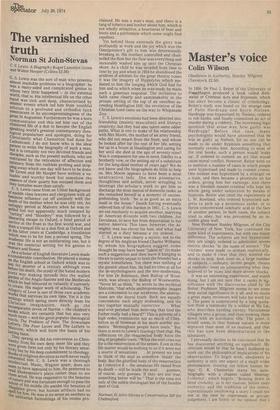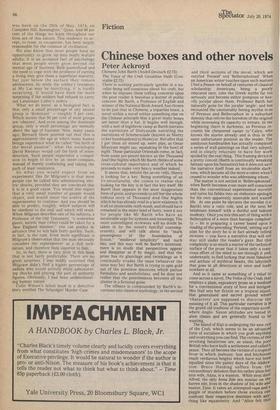Master's voice
Colin Wilson
Obedience to Authority, Stanley Milgram (Tavistock £2.50) In 1958, Dr Paul J. Reiter of the University of feepidnhagen produced a book called Antisocial or Criminal Acts and Hypnosis, which has since become a classic of criminology. Reiter's study was based on the strange case of Palle Hardrupp and Bjorn Nielsen. Hardrupp was hypnotised by Nielsen, ordered to rob banks, and finally committed an act of murder during a robbery. The interesting legal question that arose was: how guilty was Hardrupp? Before this case, many psychologists would have answered that he was as guilty as Nielsen, for no one can be made to do under hypnosis something that normally revolts him. According to most of the text books, such a person would 'wake up', if ordered to commit an act that would cause moral conflict. However, Reiter went on to mention a number of cases in which people were hypnotised and made to commit crimes. One woman was hypnotised by a stranger on a train, and then became a prostitute on his orders, giving him her earnings. And there was a Swedish master-criminal who kept his whole gang under subjection by means of hypnosis. Reiter also cited the experiments of L. W. Rowland, who ordered hypnotised subjects to pick up a poisonous snake, or to throw concentrated sulphuric acid in the face of another person. In both cases, the subject. tried to obey, but was prevented by an invisible glass wall. Now Professor Stanley Milgram, of the City University of New York, has continued the same kind of experiments, but with one major difference. The subjects are not hypnotised; they are simply ordered to administer severe electric shocks "in the name of science.The 'victims' were made to scream realistically, and to make it clear that they wanted the shocks to stop. And, even so, a large number of subjects — ordinary, decent people, chosen at random— went on administering what they believed to be more and more severe shocks.
It was an interesting experiment, and worth doing; but I am not sure that it ranks in significance with the discoveries cited by Dr Reiter. Professor Milgram seems to see some deep social significance in it all, and no doubt a great many reviewers will take his word for it. The p,oint is underscored by a long quotation from a testimony by a soldier at My Lai, who describes herding twenty Vietnamese villagers into a group, and then mowing them down with an automatic rifle. The point, it would seem, is that human nature is more depraved than most of us realised, and that this has now been demonstrated in the laboratory. I personally decline to be convinced that he has discovered anything so significant. My criticism would be that he hasn't bothered to work out the philosophical implications of his observations. To begin with, obedience to authority is only one aspect of a much wider phenomenon: trusting our fellow human beings. G. K. Chesterton starts his autobiography with a chapter called 'Hearsay Evidence', which begins: "Bowing down in blind credulity, as is my custom, before mere authority and the tradition of the elders, superstitiously swallowing a story I could not test at the time by experiment or private. judgement, I am firmly of the opinion that I was born on the 29th of May, 1874, on Campden Hill, Kensington." Quite. And 90 per cent of the things we learn throughout our lives are of this nature. This tendency to accept, to trust, to co-operate, has been largely responsible for the creation of civilisation.
We also know that most people have no opportunity to grow up into really mature adults; it is an accepted fact of psychology that most people never grow beyond the mental age of fourteen. Both parenthood and the need to cope with the problems of earning a living may give them a superficial maturity, but just below the surface they remain adolescents. So while the soldier's testimony at My Lai may be horrifying, it is hardly surprising. It would have been far more surprising if the soldiers had refused to carry. out Lieutenant Calley's orders.
What we do know, as a biological fact, is that only a small percentage of any animal group is 'dominant' — roughly 5 per cent. Which means that 95 per cent of most groups are 'obeyers'. And even among the dominant group, only a small percentage are mentally above the age of fourteen. Now, many years, ago, Bernard Shaw pointed out that this is approximately the age at which many human beings experience what he called "the birth* of the moral passion"; what the sociologist David Riesman would call the birth of innerdirection. Such people experience a compulsion to begin to live by an inner-compass, instead of merely conforming and taking the path of least resistance.
So what you would expect from an experiment like Dr Milgram's is that most people can be talked into administering electric shocks, provided they are convinced .that it is in a good cause. You would also expect that a very small number of people would object, and would resist the orders of the experimenter to continue. And you should be able to predict, roughly, which subjects will be obedient to the end, and which will resist. When Milgram describes one of his subjects, a Professor of the Old Testament, "a somewhat gaunt, ascetic man (who) could be taken for a New England minister," you can predict in advance that he will balk fairly quickly. Such, in fact, is the case. Even more significant is Milgram's observation that the man obviously considers the experimenter as a dull technician, and therefore feels superior to him.
So, in fact, there is very little in this book that is not fairly predictable. There are no great surprises. I was mildly surprised that Milgram didn't find a higher percentage of sadists who would actively enjoy administering shocks and playing the part of authority figures. Obviously, I had been underestimating human nature.
Colin Wilson's latest book is a detective story entitled The Schoolgirl Murder Case.



































 Previous page
Previous page